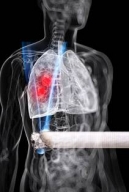If You Won’t Quit Smoking, At Least Watch for These Lung Cancer Symptoms.
Medically Reviewed by John T. Atkins, III, MD
Let’s be honest: Smoking causes lung cancer.
About 90% of lung cancers are caused by smoking. The more cigarettes you smoke a day and the younger you started smoking, the greater your risk of lung cancer. In South Carolina, lung cancer is the leading cause of cancer deaths – accounting for more victims each year than breast, prostate and pancreatic cancer combined.
Smoking pipes and cigars also causes cancer. In fact, cigars contain more cancer-causing substances, tar and toxins than cigarettes.
“The best way to reduce your risk lung cancer is to quit smoking,” says McLeod Pulmonologist John T. Atkins, MD. “For some people, it’s easy; they’ve claimed to have quit smoking dozens of times. But seriously, for many people, it’s very difficult to break the addictive habit. If you know someone like that – or if that’s you – here are symptoms to watch for.”
When lung cancer first develops, there may be no pain or visible symptoms. As the cancer worsens, the following signs may appear:
- A cough that won’t go away – even after 2 or 3 weeks.
- Wheezing, hoarseness or shortness of breath
- Repeated bouts of bronchitis or pneumonia
- Chest pain that gets worse with coughing, laughing or deep breathing
- Coughing up blood or rust-colored spit.
Signs of more advanced lung cancer include:
- Swallowing difficulty
- Eyelid drooping
- Facial paralysis
None of the symptoms by itself guarantees that you have lung cancer. But, if you have a symptom, you need to see your personal physician. When you do, here’s what will happen.
Imaging Tests
Chest X-rays may be taken right in your doctor’s office. If the doctor sees something suspicious, you may need more tests.
CT (or CAT) Scans are more likely than an X-ray to show lung tumors, in addition to revealing the exact location, size and position of the tumors. The CT can also show if the cancer has spread to the lymph nodes (metastasized).
Positron Emission Tomography (PET) Scans may also be used to map the spread of any cancer.
Tissue Tests
Sputum Samples. The doctor may take a sample of the mucous you cough up from your lungs. Microscopic inspection can reveal if there are cancer cells present.
Bronchoscopy uses a lighted fiber optic tube to examine the throat and windpipe. Your throat may be numbed and you can be given medication to relax you for the procedure. In addition to seeing the suspected area, the doctor can take a tissue sample (biopsy) for examination.
A Needle Biopsy uses a syringe and a needle smaller than one used for drawing blood samples. Cells and small fragments of tissue are withdrawn from the mass being examined. Needle biopsies don’t require a surgical incision, but might not provide enough tissue for a definitive diagnosis.
These are the most common tests. However, other studies may use ultrasound, sample liquid near the lung or require minor incisions to collect larger tissue samples.
Bottom line: If you are going to smoke, you are risking lung cancer. So keep an eye out for the obvious symptoms. See your doctor right way if you sense something is wrong.
You may also find these articles useful:
Questions to Ask Your Oncologist About Your Cancer
Stages of Cancer: What You Need to Know
Oncology Nurse Navigator: Friend, Advocate and Guide on Your Cancer Journey
Have a Question? Ask a Cancer Specialist.
Sources include: McLeod Health, Centers for Disease Control & Prevention, National Cancer Institute, National Institutes of Health, National Health Service UK, American Cancer Society, SC Department of Health and Environmental Control
-
McLEOD REGIONAL MEDICAL CENTER FLORENCE
843-777-2000 -
McLEOD DARLINGTON
843-777-1100 -
McLEOD DILLON
843-774-4111 -
McLEOD LORIS
843-716-7000 -
McLEOD SEACOAST
843-390-8100 -
McLEOD CHERAW
843-537-7881 -
McLEOD CLARENDON
803-433-3000



-
McLEOD REGIONAL MEDICAL CENTER FLORENCE
843-777-2000 -
McLEOD DARLINGTON
843-777-1100 -
McLEOD DILLON
843-774-4111 -
McLEOD LORIS
843-716-7000 -
McLEOD SEACOAST
843-390-8100 -
McLEOD CHERAW
843-537-7881 -
McLEOD CLARENDON
803-433-3000
 Find a Doctor
Find a Doctor  Locations
Locations  Services
Services 